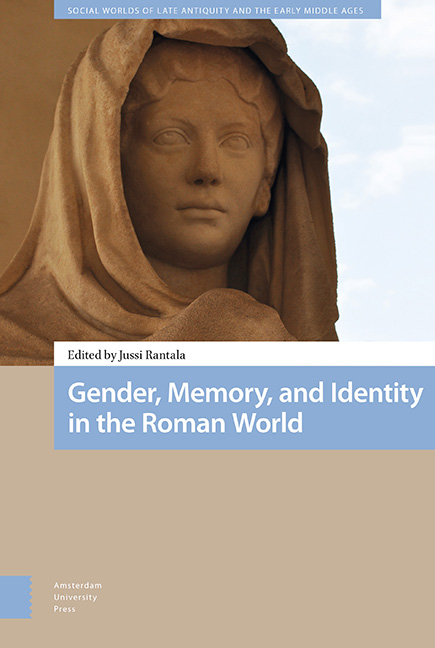Book contents
- Frontmatter
- Contents
- List of Illustrations
- Abbreviations
- Preface
- Tabula Gratulatoria
- Introduction
- 1 Public Agency of Women in the Later Roman World
- 2 Religious Agency and Civic Identity of Women in Ancient Ostia
- 3 The Invisible Women of Roman Agrarian Work and Economy
- 4 ‘Show them that You are Marcus’s Daughter’
- 5 Defining Manliness, Constructing Identities
- 6 ‘At the Age of Nineteen’ (RG 1)
- 7 Conflict and Community
- 8 Dress, Identity, Cultural Memory
- 9 The Goddess and the Town
- 10 Varius, multiplex, multiformis – Greek, Roman, Panhellenic
- 11 Mental Hospitals in Pre-Modern Society
- Index
7 - Conflict and Community
Published online by Cambridge University Press: 20 November 2020
- Frontmatter
- Contents
- List of Illustrations
- Abbreviations
- Preface
- Tabula Gratulatoria
- Introduction
- 1 Public Agency of Women in the Later Roman World
- 2 Religious Agency and Civic Identity of Women in Ancient Ostia
- 3 The Invisible Women of Roman Agrarian Work and Economy
- 4 ‘Show them that You are Marcus’s Daughter’
- 5 Defining Manliness, Constructing Identities
- 6 ‘At the Age of Nineteen’ (RG 1)
- 7 Conflict and Community
- 8 Dress, Identity, Cultural Memory
- 9 The Goddess and the Town
- 10 Varius, multiplex, multiformis – Greek, Roman, Panhellenic
- 11 Mental Hospitals in Pre-Modern Society
- Index
Summary
Abstract
This article deals with the question of constructing cultural identity by evoking memories of the past. By evaluating the poetry of Ovid and Virgil, the article discusses the role of Anna, sister of Queen Dido of Carthage in Augustan cultural context. The paper traces Anna's significance as an ‘other’, a member of people considered as traditional archenemy of Rome, the Carthaginians. Moreover, the paper also evaluates Anna's role related to Aeneas, a true Roman hero, and focuses particularly on gender both as a part of their relationship, and how it appears as a part of Roman identity during Augustan era.
Keywords: identity, marriage, memory, Ovid, Roman poetry, Virgil
Introduction
Identity can be understood as an abstract concept associated with the loyalty of an individual to a larger group based on, for example, nationality, politics, culture, profession, or gender. However, especially in the case of so-called ‘imagined communities’, such as national cultures, this kind of communal cohesion needs common stories and symbols to which members can identify with. These stories often point out to past deeds, creating common memories among people who observe them. In this sense, cultural identity can be understood as a discourse, a process of constructing significances to which one can identify. Accordingly, these significances can be found in the stories, memories, and images concerning, for example, a culture or a nation. Naturally, cultural identities can be traced to the ancient world as well, and one of these identities indeed was that of Romanness: Greg Woolf, for example, defines Romanness as membership to a political and religious community holding common values and mores (customs, morality, and way of life).
In Roman context, gender was often an important part of this cultural discourse, particularly because of the highly patriarchal nature of Roman society. Women's juridical position and their role in public life was limited; public monuments celebrated very masculine values (particularly military deeds); and so on. On the other hand, we can also find many legendary women in the stories of Roman past, defining Roman identity from their own part.
- Type
- Chapter
- Information
- Gender, Memory, and Identity in the Roman World , pp. 181 - 202Publisher: Amsterdam University PressPrint publication year: 2019



